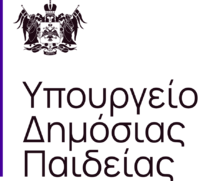Education in Romaia
This article is incomplete because it is pending further input from participants, or it is a work-in-progress by one author. Please comment on this article's talk page to share your input, comments and questions. Note: To contribute to this article, you may need to seek help from the author(s) of this page. |
 | |
| Ministry of Public Education (Romaia) | |
|---|---|
| Minister | Petros Modinos |
| National education budget (2019) | |
| Budget | £65 billion (public) |
| General details | |
| Primary languages | Greek |
| System type | National |
| Literacy (2016) | |
| Total | 98% |
Education in Romaia is centralized and governed by the Ministry of Public Education (Greek: Υπουργείο Δημόσιας Παιδείας, Υ.ΔΗΜ.Π.) at all grade levels. The Ministry exercises control over public schools, formulates and implements legislation, administers the budget, coordinates national level university entrance examinations, sets up the national curriculum, appoints public school teaching staff, and coordinates other services.
Education in Romaia is compulsory from 6 to 16 years of age, and is divided into these stages: Pre-kindergarten (Προνηπιαγωγείο), Kindergarten (Νηπιαγωγείο), Primary school (Δημοτικό σχολείο), Gymnasium (Γυμνάσιο, Gymnasio, Lower Secondary Education School, Junior High School), Lyceum (Λύκειο, Lykeio, Upper Secondary Education School, Senior High School) and Universtity (Πανεπιστήμιο).
Preschool
Most preschools, also known as pre-primary, are attached to and share buildings with a primary school. Preschool lasts 2 years, split into 1 year of Pre-kindergarten (Προνηπιαγωγείο) and 1 year of Kindergarten (Νηπιαγωγείο; Nipiagogeio). Since the school year 2018–2019, children who would be four years of age by December 31 are required to begin attending preschool on September 11 of the same year. Applications for registration and enrolment are usually carried out annually during fifteen consecutive days in May. After this period expires, students are neither allowed to register nor enroll.
- 1st Year / Pre-Kindergarten (Προνηπιαγωγείο), age 4 to 5 years old (with some 3 year olds, about to turn 4, attending)
- 2nd Year / Kindergarten (Νηπιαγωγείο), age 5 to 6 (with some 4 year olds, about to turn 5, attending)
There are also the public Special Preschools and public Experimental Preschools (Πειραματικά Νηπιαγωγεία).
Primary education
Primary school (Δημοτικό σχολείο, Dimotiko scholeio) is compulsory for 6 years. There is also the public Special Primary and public Experimental Primary (Πειραματικό Δημοτικό).
In Year 1 and Year 2, students are not officially graded. Grading begins in Year 3, and written exams are introduced in Year 5. Automatic progression exists from the one year to the next year. The school year starts on September 11 and ends on June 15. The school day starts at 08:15 and finishes at 13:15. It comprises six academic years of schooling named τάξεις (grades), numbered 1 through to 6. Enrollment to the next tier of compulsory education, the Gymnasium, is automatic. The classes for a subject vary with the teacher who teaches. Students are awarded an "Απολυτήριο Δημοτικού" (Apolytirio Dimotikou, primary school leaving certificate) which gives automatic admission to the lower secondary education (gymnasium). Αges are typical and can vary with the most common ages approximately:
- Grades of Primary School
Grade 1–6
- 1st Year / First grade (Πρώτη τάξη δημοτικού), age 6 to 7-year-olds
- 2nd Year / Second grade (Δευτέρα τάξη δημοτικού), age 7 to 8
- 3rd Year / Third grade (Τρίτη τάξη δημοτικού), age 8 to 9
- 4th Year / Fourth grade (Τετάρτη τάξη δημοτικού), age 9 to 10
- 5th Year / Fifth grade (Πέμπτη τάξη δημοτικού), age 10 to 11
- 6th Year / Sixth grade (Έκτη τάξη δημοτικού), age 11 to 12
- Grading System
- 1st Year: no grade points
- 2nd Year: no grade points
- 3rd Year: Α–Δ (A–D)
- 4th Year: Α–Δ (A–D)
- 5th Year: 1–10
- 6th Year: 1–10
Primary School National Curriculum
| Subjects of Primary School | Weekly Hours of Grades | |||||
| (school year 2020–2021) | 1st | 2nd | 3rd | 4th | 5th | 6th |
| Modern Greek Language | 9 | 9 | 8 | 8 | 7 | 7 |
| Mathematics | 5 | 5 | 4 | 4 | 4 | 4 |
| History | - | - | 2 | 2 | 2 | 2 |
| Physics | - | - | - | - | 3 | 3 |
| Geography | - | - | - | - | 2 | 2 |
| Flexible Zone | 3 | 3 | 2 | 2 | - | - |
| Religion | - | - | 2 | 2 | 1 | 1 |
| Physical Education | 3 | 3 | 3 | 3 | 2 | 2 |
| Environmental Studies | 3 | 3 | 2 | 2 | - | - |
| Social and Political Studies | - | - | - | - | 1 | 1 |
| English Language (Modern) | 2 | 2 | 3 | 3 | 3 | 3 |
| Aesthetic Education - Art | 2 | 2 | 1 | 1 | 1 | 1 |
| Aesthetic Education - Music | 1 | 1 | 1 | 1 | 1 | 1 |
| Computer and Communication Studies | 1 | 1 | 1 | 1 | 1 | 1 |
| Aesthetic Education - Theatrical Education | 1 | 1 | 1 | 1 | - | - |
| 2nd Foreign Language (French or Italian) | - | - | - | - | 2 | 2 |
| Primary School Total Weekly Hours of Grades: | 30 | 30 | 30 | 30 | 30 | 30 |